
Sings Ballads Of The Sad Cafe
by William RuhlmannChris Connor uses several different musical settings for this album of torch songs, but the main distinction is between the arrangements that employ strings, such as "The End of a Love Affair," and those that use horns, such as "Bargain Day." The backgrounds color Connor's vocal interpretations, and she often interacts with the musicians, notably with flautist Eddy Jaspar in "These Foolish Things," a virtual duet. But her primary goal is to render the lyrics with a combination of precision and emotional distance. In this sense, the heart of the album is "Glad to Be Unhappy," which Connor begins by singing the rarely heard introductory verse, then gives musical coloration to by varying the notes at the end of each line. The listener is not meant to believe the emotions the lyrics describe, but rather to savor them along with the singer. Charles DeForest's "Ballad of the Sad Café," which takes nothing but its title from Carson McCullers' popular 1951 novella, is nevertheless literary in its descriptions of lonely people, and Connor, again through note alteration, gives it a reading that puts it at a further emotional remove. The trick, of course, is that the singer's posture puts her in an even darker position than that of the songwriters; at least they are still feeling something, while she seems to be so far from love that she is denying all feeling. And in that denial, her torch burns all the brighter.
